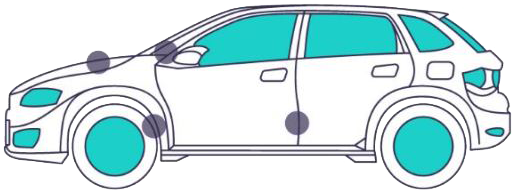Varicose blood vessels are a typical problem that affects several people, especially in insulinorm the legs. These enlarged, twisted capillaries not only position aesthetic worries yet crystalix gotas para que sirve can also create discomfort and various other symptoms. To effectively take care of varicose capillaries, it is essential to recognize the variables that contribute to their development. In this post, we will certainly check out the major sources of varicose capillaries in legs and look into the offered safety nets and treatment options.
Among the leading reasons for varicose capillaries is genes. If your parents or close family members have actually dealt with varicose capillaries, you might be genetically predisposed to establishing the problem. Researches have actually revealed that there is a genetic element to varicose blood vessels, indicating particular genes can increase your probability of establishing them. While you can not control your hereditary make-up, understanding your household history can help you identify prospective risk variables.
Additionally, certain acquired attributes such as weak blood vessel shutoffs or structural irregularities can contribute to the development of varicose blood vessels. When the shutoffs in the blood vessels come to be weakened or harmed, blood can flow backwards and swimming pool in the capillaries, triggering them to expand and become varicose.
Individuals that invest extended periods standing or sitting go to a higher threat of creating varicose blood vessels. Line of work that call for long term standing, such as registered nurses, retail employees, or factory workers, can put excessive pressure on the blood vessels in the legs. In a similar way, tasks that include prolonged periods of sitting, such as workplace job or driving, can likewise contribute to the growth of varicose capillaries.
When you stand or sit for prolonged periods, the blood in your legs has a more difficult time moving against gravity to go back to the heart. This can bring about blood pooling in the veins and raised pressure on the blood vessel walls, inevitably creating them to become varicose. Normal motion, stretching, and taking breaks to boost your legs can aid reduce this pressure and reduce the danger of varicose blood vessels.
Furthermore, obesity or excessive weight can exacerbate the stress on your blood vessels when standing or sitting, boosting the likelihood of establishing varicose blood vessels. Preserving a healthy weight can help reduce the anxiety on your capillaries and advertise much better circulation.
Pregnancy is an additional noticeable consider the advancement of varicose blood vessels. While pregnant, the body goes through significant hormonal changes that can weaken the capillary walls and shutoffs. Furthermore, the growing womb puts boosted pressure on the capillaries in the pelvis and legs, impeding blood flow and leading to varicose capillaries.
Moreover, the enhanced blood quantity while pregnant can likewise contribute to the growth of varicose blood vessels. Hormonal modifications and the included weight of the infant can create the blood vessels to extend and expand, bring about the formation of varicose blood vessels. While varicose veins while pregnant generally improve within a few months after shipment, they may aggravate with subsequent maternities.
Wearing compression stockings, elevating the legs, and routine exercise can help in reducing the risk and reduce signs and symptoms of varicose capillaries while pregnant. Consulting with a healthcare expert is necessary to ensure the safety and security of any type of treatment or preventive measures.
As we age, our blood vessels normally lose elasticity and come to be a lot more vulnerable to damage. This can result in the weakening of vein walls and valves, bring about the formation of varicose veins. Hormonal changes that occur with age, such as menopause in women, can likewise contribute to the growth of varicose capillaries.
During menopause, the decline in estrogen degrees can trigger the capillaries to become much less flexible and the shutoffs to function less effectively. This hormone inequality can impair the typical circulation of blood in the legs and enhance the likelihood of varicose capillaries.
While genes and age play substantial roles in the advancement of varicose veins, certain way of life factors can intensify the condition. Smoking, as an example, can adversely impact circulation and contribute to the weakening of vein walls and valves. Smoking cessation is encouraged to advertise total vascular health and wellness.
Additionally, a sedentary way of living and lack of regular exercise can contribute to the development of varicose blood vessels. Workout helps promote blood circulation and enhance the muscle mass that sustain capillary health. Including activities such as strolling, swimming, or cycling into your routine can dramatically reduce the threat of varicose veins.
Furthermore, a diet plan high in refined foods, salt, and saturated fats can contribute to bad blood circulation and increase the danger of establishing varicose blood vessels. Maintaining a well balanced diet regimen rich in fruits, veggies, and whole grains can advertise vascular health and wellness and minimize the probability of varicose veins.
While varicose capillaries are a common problem, comprehending the variables that contribute to their growth can equip individuals to make informed lifestyle choices and look for appropriate treatment when essential. By attending to the causes and implementing preventive measures, it is possible to reduce the risk and handle varicose capillaries successfully.
It entails making small lacerations along the tolerin gyógyszer vélemények affected blood vessel as well as eliminating the unhealthy vein segment by section.
Copyright 2022 © Theme Created By ScriptsBundle, All Rights Reserved.

The VIN is a unique identification number for your vehicle. It is 17 characters in length.
Visible through the bottom of the windscreen
Under the bonnet, usually at the front or back
Some utes and 4WDs, visible within a wheel arch
Open the door and look on the frame

The VIN is a unique identification number for your vehicle. It is 17 characters in length.
Visible through the bottom of the windscreen
Under the bonnet, usually at the front or back
Some utes and 4WDs, visible within a wheel arch
Open the door and look on the frame
Leave Your Comment